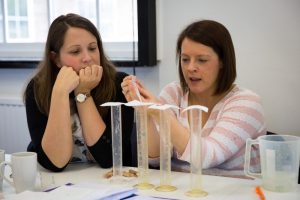In Good Taste
Friday 20th November 2015

We spend around five percent of our waking hours thinking about our next meal – cereal or toast, sandwich or sushi – but rarely think of the science behind what we’re eating. It’s a given that garlic makes your breath smell, chillies burn your mouth and that onions will have you sobbing over the chopping board, but do you know what chemistry is going on inside your body to produce these strange effects?
According to Andy Brunning, host of Science Oxford’s upcoming foodie event In Good Taste, it’s all about compounds: specifically the carbon-based organic compounds in our bodies and in our food. Andy says: “We are all made up of organic chemical compounds with a wide range of different properties, as are the foods we eat. These compounds are responsible for the flavour and aroma of the foods and drinks we consume, and can also help to explain some of the different physical effects we experience.”

Since we’re just a few weeks away from Christmas, I’ll use the Brussels sprout as an example. Loved by some and loathed by others, the sprout is a polarising vegetable when it comes to taste. If, like me, you’d rather chew on a raw turkey leg than eat a sprout, there could be a chemical and genetic reason why. Put simply, around seventy per cent of people have a genetically predisposed sensitivity to bitterness that can make vegetables such as sprouts, broccoli and kale unpalatable.
The bitterness is due to a chemical compound called phenylthiocarbamide – known as PTC – which has a bitter taste. If you’re sensitive to PTC it’s unlikely you’ll be asking for seconds of sprouts at Christmas lunch.
Andy Brunning is well placed to talk about the curious chemistry of our groceries. As well as being a chemistry graduate and teacher he is also a self-taught graphic artist with a fascination for the chemistry of everyday materials and reactions. He created the hit blog Compound Interest which has now evolved into a new book called Why Does Asparagus Make Your Wee Smell? The book addresses many strange food phenomena and answers questions like ‘Do apples contain cyanide?’ and ‘Can cheese really give you bad dreams?
It will be these kinds of gastronomic enquiries that Andy explores during ‘In Good Taste’ – an evening all about the chemistry of food. There’ll be nibbles and canapes to sample, including the pungent durian fruit (smells awful, tastes delicious) and miracle berries, which play tricks on your taste buds to turn sour to sweet. And let’s not forget the asparagus test – that should make for an interesting interval.
Science Oxford’s In Good Taste takes place at Oxford Brookes Restaurant, Gypsy Lane, Oxford, OX3 0BP on Saturday 21st November. 7.30 – 9.00pm, Tickets £15 each. To book go to www.scienceoxfordlive.com



